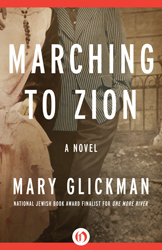Join a community of readers who are committed to Jewish stories
Sign up for JBC’s Nu Reads, a curated selection of Jewish books delivered straight to your door!
Earlier this week, Mary Glickman wrote about a strange interview question. Her most recent book, Marching to Zion (Open Road Media), is now available. She is blogging here all week for Jewish Book Council and MyJewishLearning.
 Once I started thinking seriously about the similarities in the cultural narratives of African Americans and Jews, I thought I had something exciting, something new in hand. Then I realized my “Eureka!” moment was more of a “Duh.” The common themes of slavery and liberation were self-evident. There were differences, of course. Africans were taken to the Americas by cruel force. Jews willingly went to Egypt to escape famine. They were even invited by mishpukah. Slavery destroyed African families. Apart from an occasion of Egyptian army infanticide and at least one Jewish mama who sent her baby in a basket down river, Jewish families stayed pretty much intact. American slaves were forcibly converted to Christianity. Egyptians apparently didn’t much care who Jews worshipped until plague came to town. But bondage is bondage and emancipation always bloody.
Once I started thinking seriously about the similarities in the cultural narratives of African Americans and Jews, I thought I had something exciting, something new in hand. Then I realized my “Eureka!” moment was more of a “Duh.” The common themes of slavery and liberation were self-evident. There were differences, of course. Africans were taken to the Americas by cruel force. Jews willingly went to Egypt to escape famine. They were even invited by mishpukah. Slavery destroyed African families. Apart from an occasion of Egyptian army infanticide and at least one Jewish mama who sent her baby in a basket down river, Jewish families stayed pretty much intact. American slaves were forcibly converted to Christianity. Egyptians apparently didn’t much care who Jews worshipped until plague came to town. But bondage is bondage and emancipation always bloody.
I’m sure that’s why African American spirituals, fragments of which I use for my titles, are chock full of Moses, the River Jordan, a gung-ho Joshua. During the Civil Rights Era, American Jews responded to those songs of yearning, remembering their own. Up to 60% of the white Freedom Riders, 70% of the Civil Rights attorneys, and 65% of the volunteers during Freedom Summer were Jews. Our communities were close, devoted, brothers-in-arms. And who, at least in the beginning, were the generals of these armies of righteousness? Men of the cloth. African American ministers like Martin Luther King, Jr. and Andrew Young. American rabbis like Abraham Joshua Heschel in New York and Perry Nussbaum in Mississippi. What brave, inspired men! Their congregations? Depending on the generation and hometowns of the people in question, not so much.
Recently, my novels and I were paired at an arts function with fellow author John Reynolds, whose Civil Rights Era memoir, The Fight For Freedom, chronicles his experiences as a foot-soldier in that movement. In 1965, he was an 18-year-old black from Alabama who volunteered with the Southern Christian Leadership Conference to register blacks to vote. Soon after, he was appointed a field leader by Martin Luther King, Jr. In the end, he was jailed and/or beaten more than twenty times.
In those lulls between little waves of book buyers, John and I chatted about Jews and blacks. I mentioned to him how the arrival of Northern Jews in the South as Civil Rights activists frightened Southern Jews whose profiles were suddenly raised in the eyes of increasingly enraged segregationists. When Northern activists returned North, Southern Jews became targets of revenge. Homes were burned, businesses destroyed, lives maimed. John shook his head, remembering, I suspect. He told me his own father was antagonistic to his Civil Rights activities, fearing the same treatment those Southern Jews suffered. He disowned him; they didn’t speak for years. “Luckily, I found a second father in the Movement,” John said. “A Jew. Leon Gutherz. My father and I later reconciled but Leon will always be my second father. He was the one who comforted me and mentored me through those years.”
Martin Luther King, Jr. Rabbi Perry Nussbaum. Leon Gutherz. They are all Moses.
Mary Glickman is an author, a former free-lance copywriter, public relations professional, and fundraiser who has worked with many Jewish charities and organizations. Her 2011 novel One More River was a finalist for the National Jewish Book Award. Her most recent book, Marching to Zion (Open Road Media), is now available. Read more about Mary Glickman here.
Born on the South Shore of Boston, Mary Glickman is the prolific author of Southern Jewish historical novels, including National Jewish Book Awards Finalist in Fiction’s One More River and An Undisturbed Peace, listed by Southern Living as a best novel of 2016. Ain’t No Grave is her sixth novel. She lives on Wadmalaw Island, SC, with her husband.